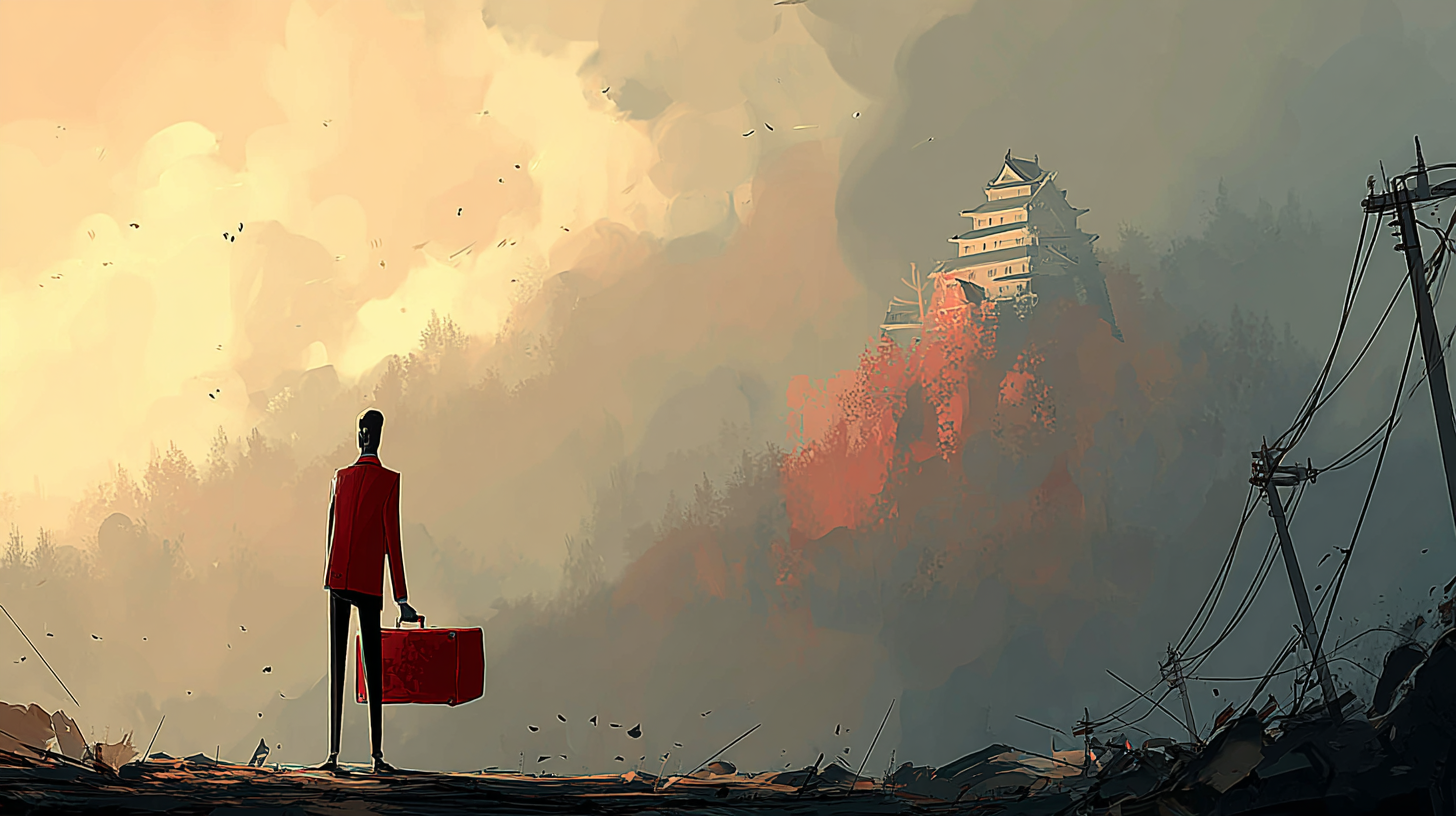“Trip” means to travel somewhere or to fall when your foot hits something.
「trip」は「旅行」や「つまずく」という意味の言葉です。
以下は英単語 “trip” に関するストーリー型学習コンテンツです。まずは大枠の意味を理解して最後の文章で確認しましょう。
主な意味(main meaning)
| 品詞 | 発音記号 | 意味 | 英語例文 |
|---|---|---|---|
| 名詞 | /trɪp/ | 旅行、旅 | We took a trip to Kyoto last summer. |
| 名詞 | /trɪp/ | つまずき、転倒 | She had a little trip on the stairs. |
| 動詞 | /trɪp/ | つまずく、転ぶ | Be careful not to trip on the cable. |
| 動詞 | /trɪp/ | ~をつまずかせる | He tripped me by accident during the game. |
語源(etymology)
「trip」は中英語 trippen(小さく踏む、はねる)から来ており、さらに古フランス語やオランダ語に由来します。もともとは「軽く歩く・はねる」というイメージから、「旅行」や「つまずく」という意味に発展しました。
類義語(synonyms)
| 類義語 | 例文 |
|---|---|
| journey | Our journey to the mountains was unforgettable. |
| excursion | The school planned an excursion to the science museum. |
| voyage | The voyage across the ocean took two weeks. |
| stumble | He stumbled on a stone in the garden. |
| expedition | They joined an expedition to explore the desert. |
反義語(antonyms)
| 反義語 | 例文 |
|---|---|
| stay | We decided to stay at home instead of going on a trip. |
| stand | She managed to stand steadily on the boat without tripping. |
コロケーション(collocations)
| コロケーション | 例文 |
|---|---|
| business trip | He is on a business trip to Tokyo this week. |
| road trip | We went on a road trip along the coast. |
| day trip | We took a day trip to the countryside. |
| trip hazard | The loose wire was a trip hazard. |
| round trip | A round trip ticket is cheaper than two one-way tickets. |
2項表現(binomials)
| 2項表現 | 例文 |
|---|---|
| trials and trips | The project succeeded after many trials and trips. |
| slips and trips | The company warned employees about slips and trips in the workplace. |
英語ストーリー(english story)
Last month, my company sent me on a business trip to Osaka. It was my first time traveling there for work, so I was excited but also a little nervous. The journey started early in the morning. I took the Shinkansen, and the round trip ticket was already booked by my manager.
When I arrived, I had a meeting with a local client. Everything went well until I almost had a trip on a loose cable in the office. It was a trip hazard, but luckily, I didn’t fall. My colleague joked, “Don’t stumble before signing the contract!”
After work, my client suggested a short excursion to a famous castle nearby. It was like a small holiday during a workday. On the way back, we talked about a future expedition to Europe for a joint project.
The following day, I had a few hours before my train, so I decided to take a day trip to Nara. I enjoyed feeding the deer and walking around the old temples. It reminded me that even a work-related voyage can bring unexpected joy.
When I returned to Tokyo, my manager asked if I would be willing to travel again. I said, “Of course! As long as there are more castles and fewer cables to trip over.” Everyone laughed, and I realized that this trip was not just about business, but also about building relationships.
和訳
先月、私は会社から大阪への**出張(business trip)**を命じられました。仕事でそこに行くのは初めてだったので、ワクワクしつつも少し緊張していました。**旅(journey)**は朝早くに始まりました。新幹線に乗り、**往復(round trip)**の切符はすでに上司が予約してくれていました。
到着すると、現地の顧客と会議がありました。すべて順調でしたが、オフィスでケーブルにつまずきそうになり、危うく**転倒(trip)するところでした。それはつまずきの危険(trip hazard)でしたが、幸いにも転びませんでした。同僚が冗談で「契約書にサインする前につまずく(stumble)**なよ」と言いました。
仕事の後、顧客が近くの有名なお城への小さな**遠足(excursion)を提案してくれました。平日の中での小さな休日のようでした。帰り道では、ヨーロッパへの共同プロジェクトの探検(expedition)**について話し合いました。
翌日、電車の時間まで数時間あったので、奈良への**日帰り旅行(day trip)を決めました。鹿に餌をやり、古いお寺を歩き回るのを楽しみました。それは、仕事に関する航海(voyage)**でも予想外の喜びがあることを思い出させてくれました。
東京に戻ると、上司が「また出張してくれるか?」と聞きました。私は「もちろんです!ただし、お城は多くてもケーブルにつまずくのは少なくお願いします」と答えました。みんなが笑い、この出張は単なるビジネスではなく、人間関係を築く時間でもあったのだと気づきました。
Q&A
Q: 「trip」と「journey」の違いは何ですか?
A: 「trip」は短期的で特定の目的を持つ旅行に使われます。観光や出張などです。「journey」は移動そのものや長い旅行に重点を置き、移動の過程や経験を強調します。
Q: 「trip」と「excursion」の違いは何ですか?
A: 「excursion」は短い外出や遠足のようなニュアンスで、楽しみや学びが目的のことが多いです。「trip」よりもフォーマルな響きがあります。
Q: 「trip」と「voyage」の違いは何ですか?
A: 「voyage」は主に船や宇宙船などでの長い旅を指します。「trip」は移動手段を問わず、短期・長期どちらにも使えますが、日常会話では短い旅を指すことが多いです。
Q: 「trip」と「stumble」の違いは何ですか?
A: どちらも「つまずく」という意味がありますが、「trip」は足が何かに引っかかってつまずくことを指します。「stumble」は不安定に歩いたり、バランスを崩したりするニュアンスが強いです。
Q: 「trip」と「expedition」の違いは何ですか?
A: 「expedition」は探検や調査のための組織的な長旅を指します。研究や探検隊などの文脈で使われます。「trip」はもっと日常的で幅広い意味を持ちます。
Q: 「trip」と「business trip」の違いは何ですか?
A: 「business trip」はビジネス目的で行く旅行や出張を指します。単に「trip」と言った場合は、仕事かプライベートかは文脈で判断されます。
Q: 「trip」と「road trip」の違いは何ですか?
A: 「road trip」は車で行く長距離旅行を指します。道中のドライブや途中の観光が重要な要素です。「trip」は移動手段を限定しません。
Q: 「trip」と「day trip」の違いは何ですか?
A: 「day trip」は日帰りの旅行を指します。「trip」は宿泊を伴う場合や日帰りの場合のどちらにも使えます。
Q: 「trip」と「round trip」の違いは何ですか?
A: 「round trip」は出発地から目的地に行き、再び出発地に戻る往復旅行を指します。「trip」は片道か往復かを特定しません。
Q: 「trip」と「trip hazard」の違いは何ですか?
A: 「trip hazard」はつまずきの原因となる物や状況を指します。旅行の意味の「trip」とは別の意味です。



コメント